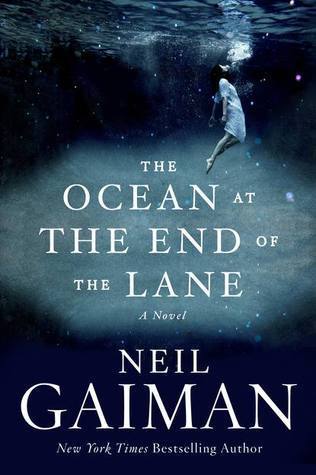Andrea Judy's Blog, page 7
July 14, 2013
Life Doesn’t Always Play Fair
So I thought I was going to be able back to updating this blog regularly at the start of the summer, but life likes to play games. My thesis was suppose to be turned in and done tomorrow, but due to some unfortunate circumstances and misunderstandings, it won’t be turned in until the end of August which is dragging out an already painful and annoying process even further.
The pushing back of my thesis very nearly pushed me to the point of dropping out. I’m so frustrated and devestated by this delay. I want to be done with this paper, with this degree more than I’ve wanted almost anything. I don’t want to spend my life writing academic examinations. I want to write stories.
I’m also moving this month to a new totally awesome place, but moving is always chaotic and stressful. This move is also keeping me from attending one of my favorite conventions, FandomFest, and that really breaks my heart. I’d really hoped to have this new place have no associations with my thesis, but unfortunately that will not be the case.
So, for now, this blog will fall into a once a week update pattern. These updates may be writing advice or they may be random personal entries, like this one, or they be be interviews.
Thanks for sticking with me.


June 29, 2013
Review: The Ocean at the End of the Lane by Neil Gaiman
The novel follows a tale of what other creatures think will make us happy, and the terrible consequences that it brings. A young boy finds himself tied into a timeless world of wonder, monsters, and delicious jam. He and his friend must find a way to send the creature home before it’s too late.
Neil Gaiman’s The Ocean at the End of the Line is like a spider web. It dares you to touch it, and be tangled into the delicate, binding world that Gaiman crafts. There are times it fades away into something just out of reach, and then, a beam of light catches it just right and the entire thing lights up with an otherworldy glow that is both terrifying and alluring.
There are other moments that the story takes you off guard, the reader walking into it unexpectedly, fighting, kicking to get the sticky tendrils off, but the story stays, clinging to skin, bone and soul long after it’s been read. You can feel the webs curling around your skin, tieing around your bones, and lingering long after the moment has passed.
There’s something delicate and wistful about the story; something not fully formed like half-remembered thoughts and moments tied together with the delicacy and strength of a spiderweb. It’s terrifying, endearing, and a breathtaking at an unbelievably fantastical childhood.


June 21, 2013
A Letter to Neil Gaiman
By this time tomorrow, I will have had the chance to meet one of my inspirations, Neil Gaiman. I know I won’t have the time, or chance to put this into words when I’m at the reading, so I just wanted to put them here as an open letter.
Mr. Gaiman,
I know you probably get hundreds of letters, emails, tweets, and smoke signals on a daily basis thanking you for your writing, and I wanted to add in my voice. Your writing has been a source of constant inspiration. Your imagination and way with words always re-excites me when I feel like I’ve lost my way, or want to give up. I actually credit you with my still writing today.
When I was 16, I had a dear friend that I wrote with. We were in the literary club at our high school and read together a lot. Words were what our friendship was built on; we’d share poetry, stories, and ideas with each other, and try to pick out exactly how you became a writer. We both loved the sky, the constellations, and were fascinated by space.
One night I went out to look at the stars, count the galaxies and see how many constollations I could recognize. Everything was cold, clear, and perfect, and I remember thinking that words are just like stars: if you put them in the right shape, they create meanings even in the dark.
While I was out counting stars on that spring night, she put a gun to her head and pulled the trigger. My world collapsed into a single dark point. I couldn’t think, couldn’t write, couldn’t speak, couldn’t do anything. I only could form three letters making up one word that echoed in my head over and over: Why?
If words hadn’t been able to save her, what was the point of them at all? I lost my love of words; I threw it away. I couldn’t imagine the thought of writing, of words, of trying to create something when it hadn’t saved anything. Despite amazing support from friends and family, I struggled through that year.
And that was when one new teacher introduced me to your work, and set me down with American Gods.
Your world weaved around me, and helped me see the language of words in the dark again. Your stories showed me that words do matter, that there is something to the rhythm and patterns of how letters crash together, and that a story can make you feel alive when you were starting to doubt it yourself.
As soon as I finished American Gods, I picked up a pencil and got back to writing for me, and for her. I wrote, and I wrote, and I wrote. And since then I’ve never stopped. I have no plans on it.
So thank you. Thank you for the wit, and wonder, and imagination that you bring into the world, and the way that you put together words, and stories into something as natural as the sky in all its varying shades. Thank you for being the inspiration that keeps me (and countless others) moving forwards.
Thank you.


June 18, 2013
What makes a ‘strong female character’?
So today is going to be a rant more than a blog post. I’ve had this rolling around in my head for a while, but I’m going to try to keep it short and sweet rather than 18000 words….
Lately I’ve been going on huge tirades about strong female characters in recent movies to my friends, family, coworkers, and random people who get too close. This all stemmed from when I first saw Iron Man 3… I won’t spoil it, but let’s just say there’s a part where a character with no fighting background suddenly becomes a fricking ninja MMA fighting master.
What bothers me about this is that it seems like any time someone mentions a ‘strong female character’ it’s because she fights. She is a badass who can fight with the boys, who shoots, kicks, and punches with the best of them. She’s tough, no nonsense, and physically strong.
But is that the only way to present a strong character?
I want characters that are smart, clever, and bad at something. I want a character who can whip anyone in a game of chass, but has never been in a fist fight. I want to see the female computer hacker save the day without having to blow up everything, without having to be rescued 8 times, and without having to prove she’s strong by breaking something….especially if that has never been her character. If she’s never been shown to fight, or been shown to be awful at fighting, don’t make her a kungfu master just to show ‘Hey, look at this strong female character!’
I want someone whose role isn’t defined by her role to a man in the story. Someone who isn’t just the wife, the girlfriend, the mother, the love interest, the femme fatale, etc. I want a character that I know is strong, not because of how many zombies she takes down, but by the fact that she is strong and solid in more than just a physical sense.
This is one of the reasons why I love Hermione so much. She’s smart, and a support for her friends. She can hold her own without having to always prove it by hitting something, when she does, it’s even more memorable.
I don’t mind a character, male or female, who can kick some ass and throw a grenade… but they shouldn’t have to, to prove they’re strong.
EDIT
What I am not saying is that I don’t like seeing badass warrior women. On the contrary, I really love the number of fighting women who have been appearing in pop culture recently. What I’m saying is that there are others ways of being strong, and that I miss seeing those.
I want my smart, clever characters to slove their problems in smart, clever ways, not suddenly start getting violent to solve their problems.


June 15, 2013
The 25 things I’ve learned at the age of 25
This Thursday I turned 25. It’s been a whirlwind year for sure, so I wanted to do a quick and dirty list of 25 things I’ve learned this year.
Sometimes things don’t work out like your planned. Projects don’t come through, and you have to move on and keep going.
Homemade jam is the best.
One thing can throw you off for months.
Sometimes, it’s totally okay to lock yourself in the shower and cry your head off.
But not every day.
A good night’s sleep can fix a lot of things.
chamomile honey tea is awesome before bed.
Don’t watch Tru Crime TV shows directly before bed or you will have weird dreams.
Writing a thesis is just about the hardest thing I’ve ever done.
Resumes, cover letters, and job interviews are worth it in the end.
There really is nothing like having great friend(s) and roommate(s) to come home to every day.
Thunderstorms make the best sleeping weather.
Writing every day is something that can be done.
Eggs are awesome…even when slightly overcooked.
When I fangirl I lose the ability to speak and just squeak. It’s mortifying.
The memory of someone saying ‘I loved your story.’ will make me smile for the rest of my life.
Cable isn’t really necessary at all.
It’s amazing to get sucked into a story whether it’s on TV, in a book, comic, video game, or a movie.
It’s okay to take a day to do nothing to keep yourself sane.
Dating is not for me.
Playing the Kinect will keep you humble. Especially about your dance moves.
The cliché will always hold true: friends and family really do make life worth living.
Salted caramel is and will always be delicious.
Writing is what I was meant to do, and what I will always come back to.
I still have a lot to learn.


June 12, 2013
How do you write what you know when you don’t know?
One of the first pieces of writing advice I was given was the age old adage of ‘Write what you know.’ I always thought it was strange advice since I wanted to write fantasy and had no idea what riding a dragon, or fighting an orc was like. How was I ever suppose to write about those kinds of things if I was suppose to write what I knew?
I still hear that advice given out on a near constant basis, but it’s not advice I’ve ever been able to give anyone. It’s taken me a while to figure out exactly how it even applies in my own writing.
Then finally, it clicked. It doesn’t mean to write about your day to day life (unless non-fiction is your thing, in which case, huge kudos to you, that’s an awesome talent!) but to use the things you know to write the things you don’t. I might not know what riding on a dragon’s back is like, but I know what it feels like to ride a horse.
Take inspiration from the world around you that you know and manipulate it into your writing to make your world more belivable. Use the details of things you know and experience to draw your reader into your world.
Everyone has a wide range of experiences in their life: love, loss, pain, joy, fear, sickness, etc. Take those emotions, or experiences to use to give your writing a solid, belivable background.
Write what you know into what you don’t know.


June 8, 2013
Saturday Inspirations
I’m going to start a once a month Saturday where I just post pictures, songs, books, etc. that have inspired me lately.
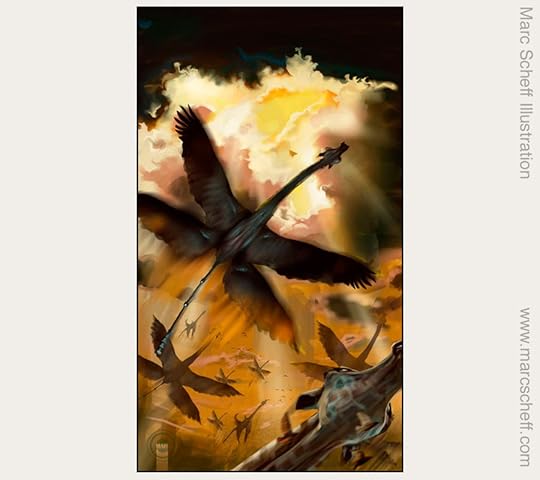
Air Elemental by ~marcscheff

Desdemona by ~JenZee

Blue Dust by `thienbao
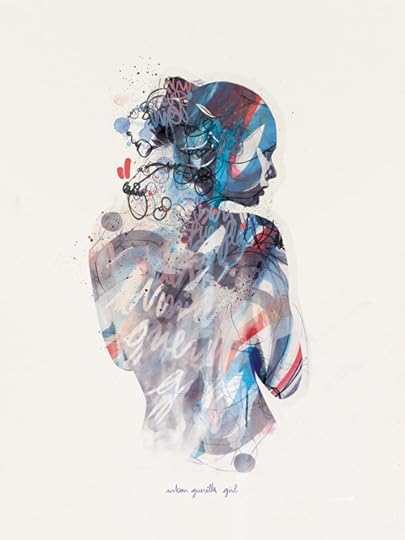
Urban guerilla girl I by `mydeadpony
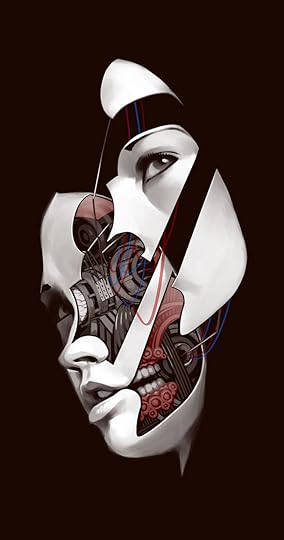
Future Face 3 by ~biz02
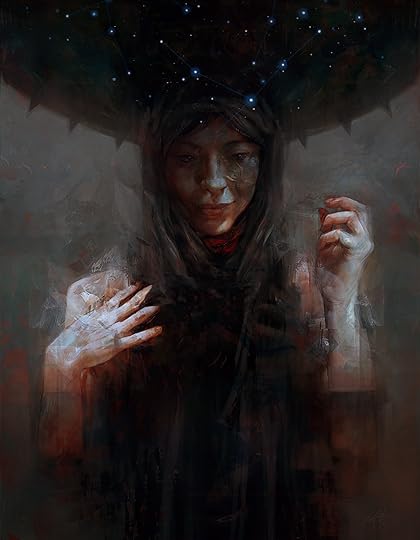
Morning Star by *jeffsimpsonkh
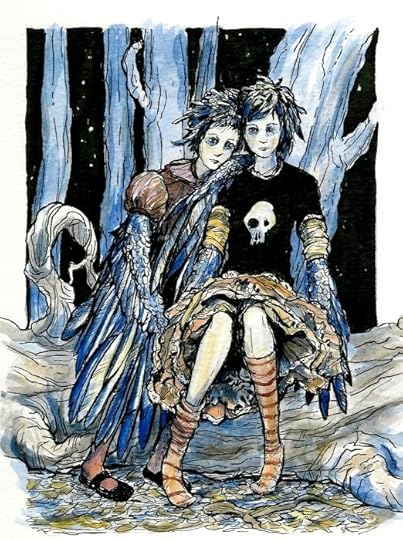
The Crow Girls by ~bluefooted
What has been inspiring you lately?


June 4, 2013
It’s Okay To Not Always Be Perfect
Staring at the blank page, waiting for the perfect words to appear has stressed me out for years. Until very recently, I would start typing, then delete everything, type again, and then delete it again. I would repeat this process until I was exhausted, and I had no writing done. All because I deleted everything that I didn’t think was perfect.
Over time, I’ve come to realize that focusing on being perfect the time around leaves me too petrified to even attempt to move forward. I get so overwhelmed that these words are not good enough that I never put words on paper.
The first draft is going to be rough. The point is not to have the fully edited, ready to go to print story done when you finish the first draft; the point is to have the draft done so that you can go back and start working over the rough patches, smoothing out the problems, and tying the story tighter together.
Some quick and dirty ways I’ve found to keep myself from tearing up my work for not being perfect on the first draft.
1. Time yourself.
When I’m writing against the timer, I give myself a goal. Say, 1000 words in 15 minutes. Then I’m focusing on writing, not on nitpicking everything that I write.
2. Write on paper
Writing on paper in pen makes me a lot less likely to go back.
3. Don’t allow yourself to go back.
Once your cursor has moved past a word, don’t allow yourself to go back. This will take some practice, but eventually you can keep at it.
It’s never an easy task, and some of what you write that first draft is going to be deleted later on, but during the initial process, focus on getting the story out, and then you can polish.
How do you get past the fear of not writing the perfect words every time?


June 1, 2013
Guest Post: Responsible Borrowing by Aaron Smith
Looking back on the five years since I seriously started writing, I consider myself lucky to have come into the business through a door opened to me by what is now known as the New Pulp movement. I’m still doing pulp work and loving every minute of it, even though I’ve expanded my work to include projects with other publishers in other genres.
Being a New Pulp writer has allowed me to learn to write in two very different, but equally satisfying ways. Sometimes, I write my own characters. In those cases, I have complete control over everything. I decide the personalities, looks, and circumstances of the people I create to populate the worlds I write about.
But on other occasions, I’ve entered pre-existing fictional universes and been given opportunities to work with characters and situations originally conceived by others, some of them very well known. I’ve written numerous stories featuring Sherlock Holmes and the associated cast of characters. I’ve used various characters created by Bram Stoker, and I’ll soon be celebrating the publication of my first story about H. Rider Haggard’s 19th century adventurer Allan Quatermain.
As I often bounce back and forth between two in-progress stories, I sometimes find myself thinking about the differences in mindset when it comes to writing my own creations versus borrowing characters who did not originate in my imagination.
In many ways, writing my own stuff is easier. There are no rules except the one all-important law that says that once I decide on something, it must remain consistent. But writing other author’s characters requires, in my experience, a certain amount of restraint. I can write in my own way (and I must, for I’m not going to pretend to be Sir Arthur Conan Doyle or Bram Stoker!), but I feel compelled to demonstrate a certain amount of respect for those who created the wonderful characters that I’ve been privileged to be allowed to borrow from time to time.
I recently said on Facebook—and this statement seemed to hit a positive nerve with a lot of people—that being a writer is like having a big box full of action figures and getting paid to play with them. This feels most true when I can write about Holmes or Quatermain or others that came into literary being long before I was born.
To put it simply, I play with those characters in a way that reflects who I am as a writer but also, I hope, retains the essence of what made them great characters to begin with. I try very hard to make sure I include the souls of the characters, and the qualities that have made them last so long and made them beloved enough that people are still willing to spend money and time to read about them even if the new stories are not by those who created them.
Using Sherlock Holmes as an example, this is how I approach working on the character: I do not try to write like Doyle, but I do try to maintain the atmosphere and style of his stories. It’s not hard to do, considering how many times I’ve read Doyle’s work, and I seem to have been at least somewhat successful at it, if the reactions of readers are any indication. Watson is the narrator, of course, and I try to keep the personalities of Watson, Holmes, and all Doyle’s supporting characters in line with what Doyle showed in his stories. I will not have Holmes facing supernatural threats. Something might appear to be supernatural, but must have a logical, earthbound explanation in the end. (A semi-exception was my novel, Season of Madness, in which Watson teams up with Dr. Seward of Dracula, but Holmes himself did not appear in that story, so I technically didn’t break my own rules!) I will not bring any elements into one of my Holmes stories that scream to me that they would not fit into the world depicted by Doyle when he created the character and made him one of the most popular characters in the world. I try my hardest to write Watson as Doyle’s Watson, Holmes as Doyle’s Holmes, etc.
In other words, it comes down to respect. Respect for the original author’s intentions (so far as we can recognize those intentions from the works left behind after the author’s death), and respect for the millions of readers who love Holmes as he was brought into the world by Doyle.
When I get the chance to work on a character I’ve loved reading about, I go into the project assuming that those who will read my work want the character to be as he’s always been. I know I feel that way about my favorite characters when I encounter the work of someone new adding to the body of work based on that character. And I’m incredibly disappointed when someone who’s been entrusted with a great character or set of characters drops the ball and makes changes that strip the character of their original essence and appeal.
I don’t want Sherlock Holmes as an action hero. I want him as a detective with a razor-sharp intellect and a brave, smart companion. There can be action scenes in a Holmes story, but a certain recent series of Holmes-based movies has gone too far in that direction. I cringe at the de-intellectualizing that’s been done to Star Trek. I can’t stand the majority of the recent product from Marvel and DC comics: characters I grew up reading about who are now unrecognizable near-parodies of what they used to be, stripped of nobility and other inspiring qualities. I’m tired of altered versions of my favorite characters.
Maybe some readers or movie-watchers do want updated, drastically changed versions of classic characters. If that floats their boats, fine. Let them have what they want. There’s plenty of that going around. But I’m confident that there are fans of Sherlock Holmes, Allan Quatermain, Dracula, and many other long-established fictional icons that like things as they long have been. There’s an audience for continuations of the traditional versions of those characters and that’s the audience I hope to entertain when I’m handed those action figures to play with, and many of my fellow New Pulp writers seem to feel the same way.
I’m fortunate to have the opportunity, from time to time, to borrow great characters. I see that as a serious responsibility and I promise to do my best to maintain those characters as I think their creators intended them to be. I won’t dumb down Watson or de-age Quatermain or rearrange fictional history by having Moriarty stand atop the Reichenbach Falls shouting, “’Lock…I am your father!” And I probably won’t resurrect Dracula and have him stalk new victims in the modern era (although that last one’s pretty hard to resist sometimes!). After all, I’d be horrified if I looked over a future writer’s shoulder in my ghostly form long after I’d died and saw him doing something like that to my characters.
I don’t own Holmes and Watson. Allan Quatermain is not my property. I stake no claim on Dracula. I just borrow them from time to time and I try to do that responsibly. I hope I succeed in that task.
Click to view slideshow.
Aaron Smith is the author of published stories in genres including mystery, horror, science fiction, and fantasy. He often visits the 221B Baker Street in his mind to write new stories for Airship 27 Productions’ Sherlock Holmes Consulting Detective series of anthologies. His latest novel, 100,000 Midnights was released in 2012. Information about his work can be found on his blog at www.godsandgalaxies.blogspot.com


May 25, 2013
Call for Guest Blogs
Happy Saturday!!
I’m looking for people interested in writing a guest blog to be featured on here. Topics can be anything writing related, and I’ve even got a great series of questions if you’d rather be interviewed.
I love being able to feature other writers up here, and I’ve only got a few guest posts for the next few months so I’m looking to expand on that.
Comment if you’re interested!



